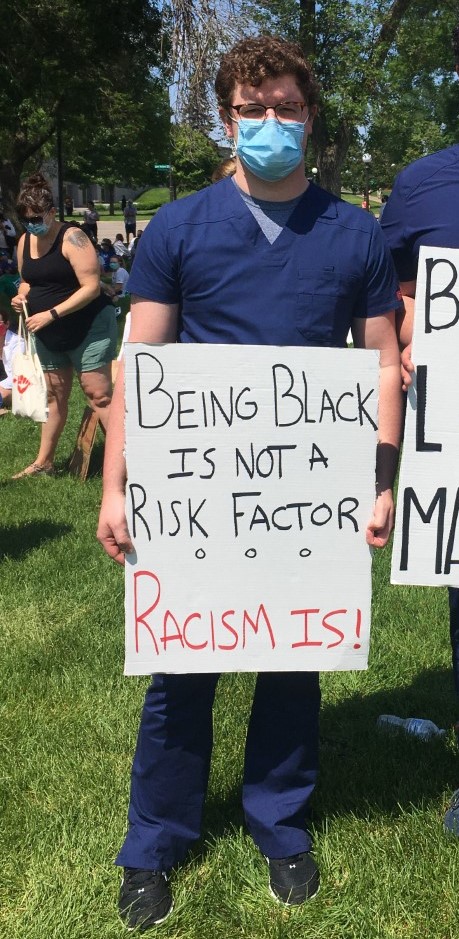Nurses Have a Role and Responsibility in Ending Racism
“There’s no way you can extricate what’s been going on and the outcomes of the (COVID-19 coronavirus) from the basic racism and social injustice and inequities that have existed in this country for so many years,” American Academy of Nursing Living Legend Catherine Alicia Georges, EdD, RN, FAAN (https://campaignforaction.org/living-legend-addresses-health-disparities-racial-injustice/), said in a June 17, 2020, podcast. “The chronicity of racism is the issue.”

Like most white people, I knew racial bias existed in the United States long before I learned of George Floyd’s murder (https://www.nytimes.com/article/george-floyd-who-is.html), which sparked worldwide protests about systematic racism. In fact, through my graduate education and professional experiences as a nurse, I recognized that many of the nation’s social systems are unfair to minority populations. What I failed to realize was the extent to which our society is complicit in these issues.
We are amid a long-overdue, national awakening on systemic racism and social inequity, an awakening that minority communities have demanded for centuries. And as nurses, it is our responsibility to advocate for the most vulnerable members of society.
Today’s social climate gives me hope for the future of our profession and nation. This is an opportunity for nurses everywhere to leverage our knowledge and unique position to change the healthcare system from inside out. And here’s how we can do just that.
Acknowledge Our Nation’s Racist History
The first step to reform is looking internally.
Ask yourself: Does my race or gender afford me opportunities that are not afforded to others? Do I make assumptions about people because of how they look or who they love? Am I treating every person I interact with the way that I would want to be treated? We—and by “we,” I mean people who were granted certain privileges simply based on our race, gender, or sexuality—have a crucial responsibility to challenge ourselves with these questions.
Discrimination isn’t always overt or violent. It is systematically embedded in our society, from education to health care to government.
Review Reformative Resources
Educate yourself: Consult ONS Voice articles on cancer health disparities (https://voice.ons.org/topic/cancer-health-disparities), such as race, gender, and sexuality, listen to Oncology Nursing Podcast episodes (https://www.ons.org/podcasts/episode-107-social-determinants-lead-unequal-access-health-care), and read ONS journal articles (https://onf.ons.org/onf/44/1/social-determinants-health-framework-studying-cancer-health-disparities-and-minority) on social determinants of health.
Medium also offers an extensive list (https://medium.com/wake-up-call/a-detailed-list-of-anti-racism-resources-a34b259a3eea) of books, articles, movies, documentaries, podcasts, and civic leaders to study. It includes antiracism resources for both adults and children, and many of the documentaries are available on Netflix.
These resources help us acknowledge the systematic inequality that’s existed throughout America’s history, and the microaggressions (https://www.vox.com/2015/2/16/8031073/what-are-microaggressions) people of color face in everyday situations.
Leverage a Trust in Advocacy
Nursing is the most trusted profession (https://news.gallup.com/poll/274673/nurses-continue-rate-highest-honesty-ethics.aspx), and we must lead by example. Nurses are integrated with all facets of society, from health care and education to public health and government. Our profession has a responsibility to be antiracist rather than “not racist (https://www.amazon.com/How-Be-Antiracist-Ibram-Kendi/dp/0525509283#:~:text=In%20How%20to%20Be%20an,our%20systems%20and%20in%20ourselves.).”
Equity and equality differ (https://www.waterford.org/education/equity-vs-equality-in-education/), although both are important in diminishing racism. As nurses we can acknowledge areas where we, our department, or our organization may be treating patients and colleagues unequally or inequitably.
Some racism may be intentional, but many times it is unintentional and has gone unnoticed for many years. Joining or starting a diversity and inclusion committee (https://www.lever.co/blog/5-steps-to-launch-an-effective-diversity-and-inclusion-council/) in your organization is a good first step to diminishing discrimination in the workplace.
Accept That You Will Make Mistakes
Acknowledging your own bias requires contradicting generations of legislation and social norms. Sometimes you will say or think the wrong thing, and that’s okay as long as you own your mistake, apologize, and, most importantly, learn from it. We can all do better. Harness that opportunity and use it to improve.
For me, becoming antiracist has been an evolutionary process and I have made many mistakes. No one is asking you to be perfect. Rather, be open to admitting that racism is embedded in this nation and now is the time to step up and change.
As we did with our LGBTQ friends and colleagues (https://voice.ons.org/news-and-views/lgbtq-patients-with-cancer), we must stand behind the people of color in our lives, give them equal opportunity to navigate all facets of life, and leave discrimination of all forms in the past.
We always have an opportunity to make this country a better place for everyone, no matter their race, gender, or sexuality. And nurses can lead the way. The United States is a nation founded on “liberty and justice for all.” It’s time we act like it.
